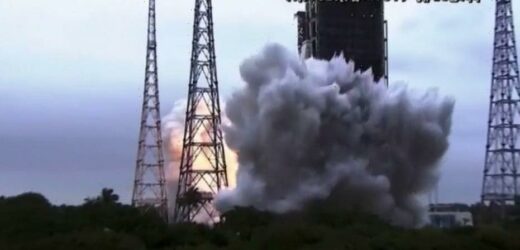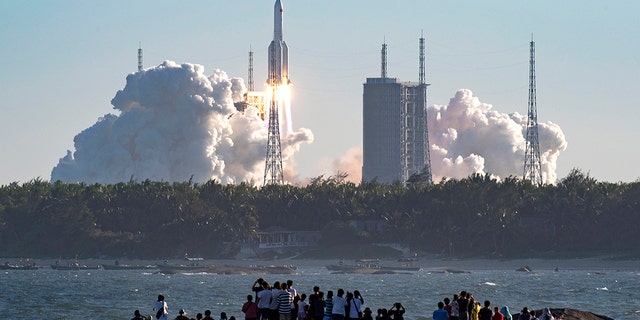Keep an eye on the sky: Chinese rocket debris to crash to earth this weekend
FOX News’ William La Jeunesse reports it’s possible the vessel could land in an inhabited area on ‘The Story’
Experts say the uncontrolled reentry of China’s Long March 5B rocket has only a small chance of hurting anyone on the ground – but Beijing’s blast-off subsidies may already be hurting the budding U.S. launch industry.
The craft launched just over a week ago carrying components for China’s upcoming Tianhe space station. Its first stage rocket, for undisclosed reasons, traveled too far up, resulting in an unpredictable, unrestrained reentry path expected to splash – or crash – down sometime this weekend.
In the meantime, the 23-ton rocket core, which is about 100 feet long and 15 feet wide, is whizzing around the planet at about 18,000 mph, inching its way toward the surface as it builds friction against the atmosphere. It’s expected to break apart, leaving much of it to burn up in the upper atmosphere, but the object is large enough for chunks to survive reentry and reach the ground – which happened when parts of another Long March rocket slammed into West Africa last year.
In this photo released by Xinhua News Agency, China’s new large carrier rocket Long March-5B blasts off from the Wenchang Space Launch Center in southern China’s Hainan Province, May 5, 2020. Pieces of its upper stage later crashed down in West Africa.
Experts can’t pinpoint when or where it’ll hit until it gets closer, and many more Long March launches are expected over the next two years.
“A simple fix China could make is to do launches where they switch off the rocket a few seconds early, so it falls into the sea right away,” the astronomer and space debris expert Dr. Jonathan McDowell, of the Harvard-Smithsonian Center for Astrophysics, told Fox News Friday. “Then they’d need extra engines on the thing the rocket is launching to get the last few miles-an-hour acceleration to its destination, and that is extra complication and expense – but worth it in my opinion.”
CHINESE ROCKET DEBRIS PHOTOGRAPHED IN SPACE
But China’s launches, according to Dr. Greg Autry, a clinical professor of space leadership, policy and business at Arizona State University’s Thunderbird School of Global Management, amount to “performance first” and “safety last,” as controlling the first stage would mean a slightly less efficient burn on the way up.
China’s Foreign Ministry spokesman Wang Wenbin said during his daily news briefing Friday that Beijing was following the reentry closely.
AXIOM SPACE TELLS HOUSTON ALL SYSTEMS ARE GO FOR WORLD’S FIRST COMMERCIAL SPACE STATION
“It is common practice across the world for upper stages of rockets to burn up while reentering the atmosphere,” he asserted. “On April 29, a Long March-5B Y2 rocket successfully sent into orbit the space station’s core module Tianhe. China is following closely the upper stage’s reentry into the atmosphere. To my knowledge, the upper stage of this rocket has been deactivated, which means that most of its parts will burn up upon reentry, making the likelihood of damage to aviation or ground facilities and activities extremely low.”
The image comes from a single, 0.5-second exposure, remotely taken with the "Elena" (PlaneWave 17″+Paramount ME+SBIG STL-6303E) robotic unit available at Virtual Telescope. The telescope tracked the exceptionally fast (0.3 deg/second) apparent motion of the object.
(Gianluca Masi, The Virtual Telescope. www.virtualtelescope.eu)
But that hasn’t been common practice since the mid-1960s, according to Autry, who is also a member of the FAA’s Office of Commercial Space Transportation advisory board.
CHINESE SPACE JUNK NARROWLY MISSED HITTING NEW YORK CITY
Every other space-capable country predicts within inches where its rocket stages will splash down – nearly always safely in the water, he told Fox News Friday. That includes Russia, which launches its rockets from a landlocked location. Or in the case of SpaceX, the first stage rockets are designed to return to the surface intact for reuse.
“Second stages are also deorbited under control at specific locations,” he noted. “Nothing is left to chance. U.S. launch regulations require a 1 in a million or less chance of a dangerous collision with a ship or airplane – and hitting anything on the ground is absolutely not an option.”
And China’s aggressive push to slash the cost of freight aboard commercial launches is hurting U.S. startups too, as Beijing subsidizes Chinese launches and aims to squeeze American businesses out of the emerging industry as it has in other sectors, he said.
“A U.S. company, we were getting $40,000 per kilogram to [send to] synchronous orbit, and the new startups were expecting a $25,000 to $30,000 price – and then the Chinese started to come in and announce $5,000,” he said. “So it’s not like the cut it 10% or 20% or even half.”
ORBITAL ASSEMBLY CORP. AIMS TO HAVE LUXURY SPACE HOTEL OPEN IN 2027
“There’s no reason for it other than to cause damage in the market and try to grab market share through price dumping,” he said. “But that’s because the rockets that they’re using are actually Chinese ICBMs that they’ve been given for free.”
U.S.-based SpaceX, meanwhile, developed its own rockets in-house at substantial expense. And the Phantom Space Corp. startup plans to purchase American-made engines from Denver’s Ursa Major.
Yet they’ll have to compete with China’s slashed prices.
Meanwhile, if pieces of the Long March rocket do damage anything on the surface, China would be liable under the 1967 Outer Space Treaty, Autry said.
White House Press Secretary Jen Psaki brought it up during her daily news briefing as well – calling on “the international community to promote leadership and responsible space behaviors.”
“It’s in the shared interests of all nations to act responsibly in space to ensure the safety, stability, security and long-term sustainability of outer space activities,” she said.
CLICK HERE TO GET THE FOX NEWS APP
Autry, a former member of the Trump administration’s NASA Landing Team, said China would likely be incentivized to improving its safety measures if other countries called out Beijing’s risk taking.
“It would be incumbent on the State Department and other U.S. commentators to say this, and better yet, the Europeans and allied nations to have to comment on this, and I think make it clear that if there were damages or loss of life caused that we would not look the other way,” he said.
Source: Read Full Article





